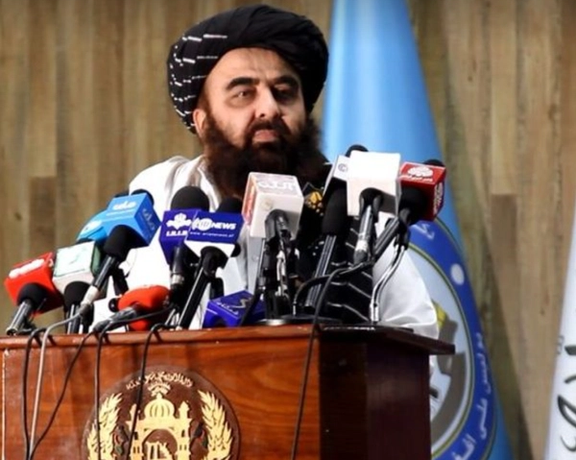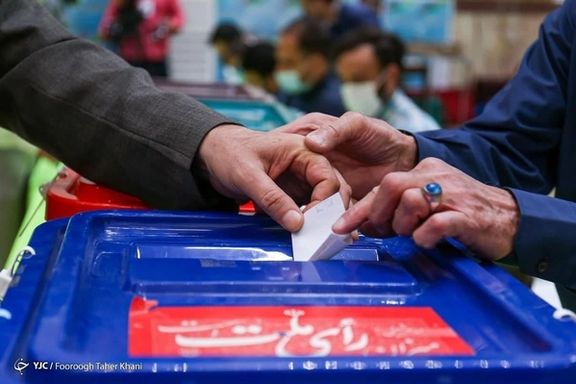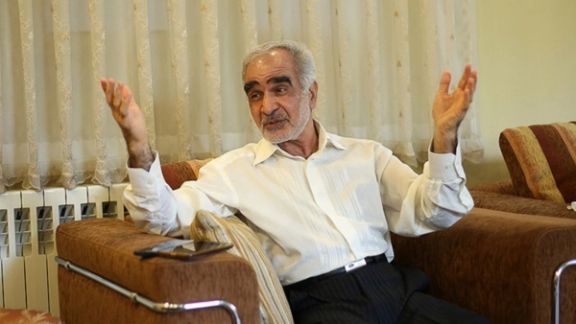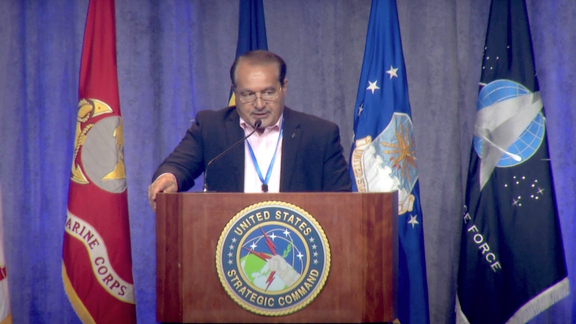Taliban Mocks Supporters Of An Inclusive Government For Afghanistan

At a religious scholars' gathering in Kabul, the Taliban's Foreign Minister used sarcasm to address countries supporting an all-inclusive government in Afghanistan.

At a religious scholars' gathering in Kabul, the Taliban's Foreign Minister used sarcasm to address countries supporting an all-inclusive government in Afghanistan.
During his address, Amir Khan Muttaqi highlighted the contrast between the number of prisoners held by the Taliban and the reported executions carried out by other countries.
"Our prisons do not have as many inmates as you execute," stated Muttaqi, addressing the countries advocating for the formation of an all-inclusive government. He did not mention any specific nations but many presume his sarcastic remarks were aimed, in part, at the Islamic Republic of Iran, often accused of making opponents disappear and executing them. "In your country, thousands have disappeared, yet nobody dares to ask about it,” Muttaqi said, avoiding directly calling out any one country.
The Taliban's Foreign Minister's remarks come after the international community has consistently called on the Taliban to adopt an inclusive approach in forming a government.
"Do you have an inclusive government?" questioned Muttaqi, his words laced with irony and deliberately undermining the credibility of the governments supporting this initiative.
The Taliban considers the formation of their own system as an internal matter and Mottaqi reiterated the group's stance against external interference.
The international community has also consistently called on the Taliban to adopt an inclusive approach in forming a government. In the past months, tensions between Tehran and Kabul have escalated, resulting in a series of incidents that have strained relations.
One of the deadliest incidents involved a border clash, resulting in the deaths of two Iranian soldiers and one Taliban fighter. The incident followed Iranian President Ebrahim Raisi's warning to the Taliban regarding Iran's water rights under the 1973 treaty. The Taliban responded with defiance, and a former Taliban official's viral video mocked President Raisi's stance.

Iran is slowing the pace at which it is accumulating uranium enriched at 60 percent, the International Atomic Energy Agency (IAEA) is expected to report in September.
Bloomberg reported Thursday that IAEA inspectors are preparing to submit their quarterly report on Iran to members of the agency’s board ahead of their mid-September meeting.
There have been media reports in the past few months that the United States is indirectly negotiating with Iran over a step-by-step approach to relax sanctions in return for a slowdown in Tehran’s nuclear program.
Earlier in August Washington approved the release of $6 billion of Iran’s oil money frozen in South Korea due to US sanctions, in exchange for the eventual release of five US citizens held hostage by the Islamic Republic. This followed a move by the Biden administration in June to allow Iraq to release $2.7 billion it owed Iran for imports of gas and electricity.
The funds will be transferred to Qatar and Oman from where Tehran can use the money for imports of food, medicine and other non-sanctionable goods, according to the United States.

If the IAEA reports a slowdown in Iran’s uranium enrichment, it would strengthen speculations of a non-written and informal deal between Tehran and Washington. While the Biden administration wants to reduce tensions in the region before the US presidential elections next year, it does not want a formal nuclear agreement with Tehran perhaps to avoid Congressional oversight. According to a 2015 law, Congress must have a say in any new nuclear deal.
Already, Iranian oil exports have increased, despite US sanctions, to almost pre-sanctions levels, with the highest shipments reported for August. Iran exported an average of 1.85 million barrels per day, an almost 30 percent jump from previous months.
A Reuters survey published on Thursday showed OPEC’s oil output rose in August as Iranian supply jumped to its highest since 2018, despite ongoing cuts by Saudi Arabia and other members of the wider OPEC+ alliance to support the market.
Iran is exempt from OPEC cuts and its exports have been rising in 2023 despite US sanctions, although views differ as to the exact scale. The overall development, some analysts say, is adding to OPEC+'s challenge in managing the market.
"Iran's output and export data are not transparent and major decision-makers like OPEC+ that adjust their production to balance the market can't be assured of Iran's supplies in the months to come," Sara Vakhshouri of consultant SVB International was quoted by Reuters as saying.
Iran’s oil shipments declined to around 200,000 barrels per day from a high of more than 2 million barrels after the United States withdrew from the JCPOA nuclear deal in 2018 and imposed sanctions. However, Tehran began increasing its exports toward the end of 2020 when President Joe Biden signaled his decision to try to return to the JCPOA. China, Iran’s main customer, apparently seeing signs of a softer approach by the US began increasing its purchases.
Nearly 18 months of talks to revive the JCPOA failed in September 2022, but shortly after secret talks apparently resumed.
The current jump in exports appears to be related to these secret talks between Tehran and Washington. Reuters quoted analysts as saying the higher exports appear to be the result of Iran's success in evading US sanctions and Washington's discretion in enforcing them as the two countries seek better relations.
So far, there is no visible positive signs of higher oil revenues on Iran’s beleaguered economy, because US banking sanctions apparently limit Iran’s hard currency gains from the sales. If the Biden administration also relaxes the banking sanctions, Iran’s annual oil revenues could easily surpass $40 billion.

Iran has accused Israel of plotting to sabotage its defense industry and the production of missiles by supplying defective parts, state media reported on Thursday.
Thursday night, Iran’s government-controlled media announced that a major security announcement would be made in hours, but nothing was announced. Finally, on Friday Iran released a video and a short report showing hundreds of parts said to have been defective and discovered due to the vigilance of intelligence entities.
However, Iranian journalists abroad pointed out that if the parts were indeed defective and reached Iran it means the Islamic Republic spent huge sums to acquire the fake or defective black-market parts, and now wanted to turn the fiasco into an intelligence success story.
"The intelligence unit of the Defense Ministry thwarted one of the largest sabotage plots targeting Iran's missile, aviation and airspace military industry," Iranian state TV said.
"This sabotage was carried out under the guidance of the Zionist intelligence services and their agents."
There was no immediate response from Israel. There have been reports in the past of foreign intelligence organizations succeeding in supplying defective dual-use parts to Iran. In 2010, a malicious computer worm dubbed Stuxnet was discovered in Iran that worked to sabotage Iran’s nuclear program by targeting supervisory control and data acquisition. It was believed that the bug was developer by Israeli and US intelligence services.
An unnamed Iranian defense ministry official was quoted by state media as saying a network of agents sought to introduce defective parts into the production of advanced missiles.

Iran's Deputy Speaker of Parliament has drawn an analogy between Supreme Leader Ali Khamenei's role in the regime and that of a "pilot of the plane."
"The pilot determines the course, and the co-pilot must follow," said Mojtaba Zolnouri, whilst identifying President Ebrahim Raisi as the co-pilot. “If the president doesn't obey the Supreme Leader, people must pay the price,” he added.
On Wednesday, Supreme Leader Ali Khamenei commended President Ebrahim Raisi's administration for making advancements in enhancing relations with neighboring nations. Additionally, Khamenei aimed to justify the record of the Raisi administration by lauding its positive economic figures and "achievements," a stance that many experts and numerous Iranian regime politicians dismiss as political propaganda.
Zolnouri clarified that the president's identification as the nation's ‘co-pilot’ is not due to his proximity to leadership but rather from Raisi’s status among top authorities. Nevertheless, he reiterated that the leader is not subject to presidents' opinions; while officials offer views in expertise and consultation, ultimate decision-making rests with the Supreme Leader. “It's the president who must adhere to this authority,” he said, asserting that deviation from the pilot's decision is impermissible.
Regarding recent nationwide protests, Zolnouri blamed “external influences manipulating the virtual space, coupled with internal issues.” He countered the belief that such events signal the end of the Islamic Republic, asserting that “a system rooted in people's convictions remains resilient despite enemy-generated turbulence.”
The recent protests were the most widespread in the history of the Islamic Republic. The clerical regime has refused to recognize that the unrest triggered by the death in custody of a young woman in September was a genuine popular expression of dissatisfaction at the multiple crises Iran faces.

A former labor minister and leader of one of Iran's leftist Islamist groups has said the all-conservative government has failed to reach its economic objectives.
Mohammad Salamati, the head of the Islamic Revolution's Mojahedin Organization (IRMO), added in an interview with Rouydad24 website that the immense economic pressure on the people has made them politically indifferent. Salamati further attributed the government's failure to wrong policies as well as naivete and weakness of government managers.
Meanwhile, he called on the government and influential regime figures to pave the way for political participation rather than restricting people's choices before it is too late.
Salamati went on to say that the people are currently facing high inflation, unemployment and social restrictions including the government's heavy-handed control of the Internet and information dissemination. This, he said, has eroded people's hope and made them indifferent and reluctant to participate in the upcoming parliamentary elections in March.
"The Guardian Council’s vetting of the candidates and its discretionary supervision of the election has made the people certain that the vote is not going to change anything in Iran. It appears that a large part of those who hold political power in Iran do not believe in people's participation in determining their own fate," Salamati said. He was referring to mass disqualification of more moderate candidates in 2020 and 2021 elections.

"Salamati added that "Only a competitive, free and fair election can restore people's trust in the government. It is only in that case, and with an improvement in the people's livelihood that they may be encouraged to participate in the elections." However, he said that "hard-headed officials are not capable of doing that."
Meanwhile, in a report about Iran's economic situation, Khabar Online website wrote last week that "The Raisi administration has failed to control the inflation rate and quoted an economist as saying that chronic high inflation will lead to the gradual deterioration of the country's infrastructures."
Iranian economist Mohammad Salimi Boroujeni told Khabar Online that the situation has left many businessmen with no motivation and reversed many conventional economic mechanisms.
The website wrote that Raisi’s promises about reducing the inflation rate to single digits have led to no tangible results and currently the inflation rate is around 47.5 percent at the start of the third year of Raisi's presidency.
However, some officials, including Economy Minister Ehsan Khandouzi even claim that the administration is ahead of its plans in controlling inflation and liquidity growth. He also promised that by March 2024, the inflation rate in Iran will be at its lowest point in five years.
At the same time, economic experts have told Khabar Online that Khandouzi's statement is contrary to what they see in terms of the people's livelihood and their purchasing power.
Boroujeni told the website that inflation has risen and the economic crisis has further deepened although the price of oil has remained stable, and officials claimed that the government's oil income is at a desirable level adding that according to them Tehran receives the oil money in cash.
The economist added that the government's handling of the economy has reduced people's purchasing power, increased poverty and inequality and damaged growth and production in the country.
Nonetheless, he said that the government is likely to come up with a bigger budget deficit by the end of the year. However, he added that financial discipline, a reduction in the government's expenses and wasteful activities, as well as increased transparency about the its financial operations can restore people's trust in the regime.

US military leaders hosting a controversial former Iranian diplomat as a keynote speaker in a strategic event has shocked and outraged many in the United States.
Princeton University faculty member Hossein Mousavian, who made headlines last year for bragging about the regime’s revenge against American officials over the targeted killing of IRGC's Quds Commander Qasem Soleimani, delivered a speech at the US Strategic Command’s Deterrence Symposium earlier in August. The US and EU-designated Soleimani coordinated Iran's proxy militant groups throughout the region to attack Israeli and US interests.
The Pro-Tehran pundit served as a key figure in Iran’s nuclear negotiations with the international community until 2005 and currently is a Middle East Security and Nuclear Policy Specialist at the Program on Science and Global Security at Princeton. Oddly enough, he used to be the editor-in-chief of the regime-affiliated daily Tehran Times, which recently published a “sensitive” US government memo purportedly sent to US Iran envoy Robert Malley informing him of his security access suspension.
Mousavian’s appearance at the mid-August high-level event, which came to light on Monday, drew criticism from former US officials and Iran analysts as well as Iranian dissidents, who questioned why America’s premier military outfit would host someone who maintains close ties to the Islamic Republic and has even indirectly lauded the regime’s efforts to assassinate American leaders.
In January 2022, his remarks in a documentary made in Iran to mark Qassem Soleimani’s second death anniversary led to controversy when he gloated about how Iran’s threat to avenge Soleimani killing frightened the wife of Brian Hook, Washington’s special envoy for Iran at the time. “An American told me that Brian Hook’s wife had not slept for several days and that she was shaking and crying. That’s how afraid they were” Mousavian said gleefully in the documentary.
Reacting to Mousavian’s presence at the event, Omri Ceren -- a journalist and the national security advisor for US Senator Ted Cruz (R-TX) -- pointed out that there are many US officials sympathetic to the Iranian regime.
"Mousavian helped lead the murderous Iranian regime’s efforts to obtain nuclear weapons so it could threaten the United States and our allies with annihilation," said Rep. Jim Banks (R-IN), a member of the House Armed Services Committee. "Now he’s in semi-retirement at Princeton as a full-time propagandist for the IRGC. Inviting him to spread lies at a US military seminar is insanity."
The former regime official started his speech at STRATCOM’s Deterrence Symposium 2023 noting that he was arrested in 2007 in Iran over charges of espionage for the US and was banned to hold any diplomatic post. However, former Foreign Minister Javad Zarif, one of the main architects of the 2015 nuclear deal, described him as an official committed to the regime who "continues to work hard" for Tehran’s interests while working at Princeton.
Mousavian, who traveled to Iran to attend Soleimani's funeral, was Tehran’s ambassador to Germany when four Iranian dissidents were assassinated at Berlin's Mykonos restaurant in 1992. In December 2021, an American academic who was imprisoned in Iran for 1,216 days, said Mousavian is sympathetic to the Iranian regime, claiming that he stymied efforts to free him from prison.
Gabriel Noronha, a former Iran adviser at the State Department, told the Washington Free Beacon, "The decision to invite former Iranian ambassador Mousavian to speak to STRATCOM is unimaginably foolish.
He is a pawn and propaganda agent of the Iranian regime, Noronha added. "Congress should investigate the decision-making process that led to this entirely inappropriate speaking invitation."
Alireza Nader, a US-based Iran scholar, said it is "outrageous and dangerous that US STRATCOM invited a former regime official connected to the assassination of Iranian dissidents to be a speaker at its symposium, providing him access to America’s most senior military officials."
During his remarks at the STRATCOM event, Mousavian thanked Gen. Anthony Cotton – the commander of the US Strategic Command -- for inviting him to the event and said he would present an "Iranian perspective" on the current threat landscape within the Middle East. The United States must "rewrite their policy in the Middle East," he added.
He went on to criticize what he called American acts of aggression towards Iran, highlighting former President Donald Trump's decision to withdraw from the 2015 nuclear deal. What he said was somehow the repetition of his views summarized in an article he penned for the Middle East Eye in 2020: Biden needs to revive the JCPOA, remove Iran’s Revolutionary Guard from the US terror list, and lift the sanctions against regime’s senior officials.
Describing him as “an agent of the Iranian regime,” Advocacy group United Against Nuclear Iran (UANI) called on Princeton last year “to dismiss him from any association or affiliation with the university without delay”, noting that “Mousavian’s affiliation with Princeton is a stain on the university’s reputation and credibility”.






